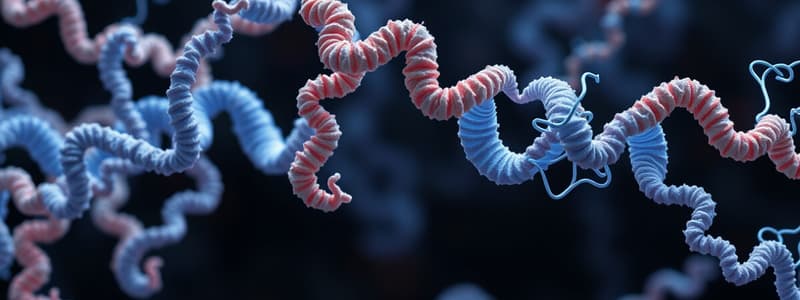Podcast
Questions and Answers
What is the function of Structure in proteins?
What is the function of Structure in proteins?
- Chemical messengers
- Recognize and combine with materials
- Speed up chemical reactions
- Support for tissues (correct)
What role does Signaling play in proteins?
What role does Signaling play in proteins?
- Contract muscle fibers
- Carry oxygen in blood
- Send signals between cells (correct)
- Preserve amino acids
What is the function of Defense in proteins?
What is the function of Defense in proteins?
- Transport materials
- Support for tissues
- Recognize and combine with other materials (correct)
- Speed up chemical reactions
What is the Transport function of proteins?
What is the Transport function of proteins?
What do Contractile proteins do?
What do Contractile proteins do?
What is the Storage function of proteins?
What is the Storage function of proteins?
What is the function of Enzymes in proteins?
What is the function of Enzymes in proteins?
Flashcards are hidden until you start studying
Study Notes
Major Functions of Proteins
-
Structure
- Provides support for tissues and connects various body parts.
- Examples include collagen and keratin, essential for skin and hair structure.
-
Signaling
- Functions as chemical messengers that facilitate communication between cells.
- Important components include membrane proteins, serotonin (linked to mood), and hormones like insulin.
-
Defense
- Proteins that recognize and bind to foreign materials, playing a key role in the immune response.
- Immunoglobulins (antibodies) and various cell membrane proteins are critical in this function.
-
Transport
- Binds to specific substances, enabling their movement throughout the body.
- Hemoglobin is a primary example, transporting oxygen in the bloodstream alongside membrane transport proteins.
-
Contractile
- Proteins that allow for muscle contraction and movement by interacting with muscle fibers.
- Key proteins involved include actin and myosin.
-
Storage
- Acts to preserve amino acids until the body requires them, ensuring a reserve is available for various functions.
- Albumin found in egg whites is a notable example of a storage protein.
-
Enzyme
- Catalyzes specific chemical reactions, significantly increasing their reaction rates.
- Lactase is a well-known enzyme that breaks down lactose, facilitating dairy digestion.
Studying That Suits You
Use AI to generate personalized quizzes and flashcards to suit your learning preferences.



